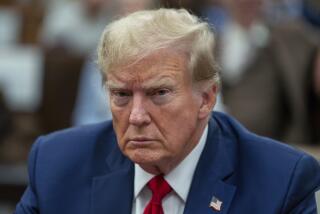Bush Takes Shots at Rivals on the Right : Politics: During a trip to Chicago, the President warns against listening to ‘siren’s song’ of ‘America first’ message. He admits economy needs a ‘kick.’
- Share via
CHICAGO — Confronted with a new GOP challenge to his reelection aspirations, President Bush opened fire Tuesday at his Republican opponents and what he called the “siren’s song” of their “America first” message.
In tumultuous visits to the commodity trading floors of the Chicago Board of Trade and the Chicago Mercantile Exchange, Bush conceded that the U.S. economy is in need of a “kick” to “get it started up again.”
Imposing himself only minutes later on a working-class tableau, Bush downed cheeseburgers with sheet-metal workers at the famed Billy Goat Tavern and commiserated with them about the sluggish pace of economic recovery.
The remarks and posturing on the day that conservative commentator Patrick J. Buchanan entered the Republican presidential race reflect the degree to which White House attention has been wrenched both left and right by accusations that Bush has neglected domestic concerns.
But with the President still planning to wait until next month before disclosing his proposed remedy for the economy, he used his barnstorming stop here primarily to seek out new backdrops for a campaign message emphasizing free trade.
Against Democratic calls for a tougher trade policy and Buchanan’s explicit embrace of the “America first” slogan, Bush warned anew that a protectionist stance would “shrink markets and throw people out of work.”
“We need to stand together against that call from the left and against that call from the right to stay within ourselves,” Bush declared in a speech at the Mercantile Exchange. “We owe the world leadership, and they’re going to get it from this President.”
On the day that Buchanan entered the GOP race, Bush’s gesture to “the right” took on a pointed significance.
In an interview, Republican National Committee Chairman Clayton K. Yeutter insisted that Bush supporters are “not worried” by the Buchanan candidacy. “We do not think he will be a significant figure,” Yeutter said here. “He has limited appeal.”
But Yeutter conceded that Buchanan’s conservative message is likely to transform the commentator into a “presence” as the political stage shifts to New Hampshire early next year for the nation’s first presidential primary. And with former Ku Klux Klan leader David Duke also appropriating a take-care-of-America-first message, the President seemed determined to blunt its appeal.
“We cannot withdraw, we can’t pull back,” Bush told Mercantile Exchange officials after being mobbed on a tour of a frenzied trading floor selected by the White House to symbolize American engagement in world markets.
“We are the hub of the international market,” Bush said. “And countries that are emerging into democracy are looking to us for leadership.”
As he rang the Board of Trade’s opening bell at what he called “this great market,” Bush seemed to take pains not to be seen as over-celebratory. He conceded that he is “not happy” about the state of the economy and vowed to work with Congress to “get this country moving.”
But the President quickly came under criticism from local Democratic leaders, including Chicago Federation of Labor President Robert Healy, who complained to reporters at the Mercantile Exchange that Bush “lives in a different world from you and me.”
“He talks about a future created by pork bellies and futures, but he doesn’t talk about a future created by manufacturing and farming and building,” Healy said of the attention Bush showered on the white-collar traders.
The White House moved swiftly to deflate that line of attack as Bush moved on immediately to the Billy Goat Tavern, a working-class dive made famous in a skit on the television show “Saturday Night Live.”
As Bush devoured a lunch of two greasy “chee-borgers” wrapped in wax paper and guzzled “Coke not Pepsi,” he shared a table with customers who had been asked by White House staffers only minutes earlier whether they would like to dine with the President.
Most of the conversation was inaudible to reporters. But those at the table said later that the conversation ranged from events in the Soviet Union to the state of the economy.
More to Read
Get the L.A. Times Politics newsletter
Deeply reported insights into legislation, politics and policy from Sacramento, Washington and beyond. In your inbox twice per week.
You may occasionally receive promotional content from the Los Angeles Times.










